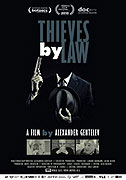Résumés(1)
La mafia russe n'a jamais été structurée verticalement, mais est constituée d'une myriade d'organisations ancrées au plan local ou régional, voire à l'échelle d'une province ou d'une République. Du code d'honneur des brigands du XIXe siècle aux assassinats crapuleux d'aujourd'hui, en passant par la surprenante collusion du crime organisé avec le pouvoir soviétique sous Lénine et sous Staline, le "métier" a fortement évolué. Depuis le démantèlement de l'URSS, la mafia russe a connu une fulgurante "perestroïka". Trois "parrains" ont accepté de témoigner: Alimzhan Tokhtakhounov, dit « le Taïwanais », recherché par Interpol, Leonid "Macintosh" Bilounov, retiré en France, finance généreusement l'église orthodoxe de Cannes. Et Vitaly Diomotchka, le plus redoutable du trio, s'est recyclé dans le cinéma. (texte officiel du distributeur)
(plus)Critiques (1)
Let's see which criminal is more successful - the one who escaped from prison six times, who was pursued by the police of six countries and Interpol itself, and then gave exclusive interviews to newspapers and magazines to become a recognized celebrity, or the one who steals on a large scale in anonymity and never gets caught, possibly enjoying the ill-gotten wealth with a decent reputation even as a philanthropist. The Russian criminals depicted in the documentary belong to the first category, and it is fascinating in its way to watch their testimonies on camera, even though anyone who wants to could have formed an opinion about the wild Yeltsin years in privatized Russia and the chaos of Gorbachev's unmanaged perestroika a long time ago, and the immense level of corruption and the absence of state structures that could withstand the wave of crime should not come as a surprise. While crime was influential and significant amounts of money were embezzled in other post-communist Europe countries, there practically was no business in Russia that did not have its origins and methods rooted in organized crime. One cannot help but be amazed by the openness of criminal bosses who are practically one hundred percent certain of their impunity. Russian organized crime is not smart and efficient; it is rather brutal and audacious. A similar documentary has never been made in the past and will not be made, for example, about the activities of Nigerian fraud gangs, Chinese triad societies, or the mafia and the Camorra in Italy. These groups are much more efficient and know very well what the law of silence means. In any case, it is a very interesting and exceptionally powerful documentary in terms of content, revealing a lot about contemporary Russia and its society. Overall impression: 95%.
()

